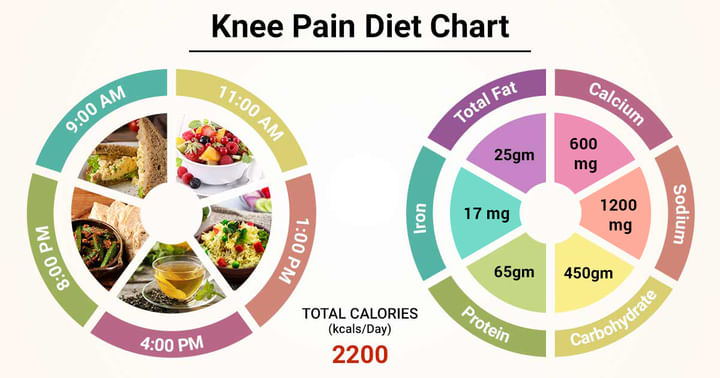Get the App
For Doctors
Login/Sign-up
About
Health Feed
Find Doctors
Diet Chart For knee pain
Last Updated: Jan 20, 2025
About
Knee pain can be caused by various reasons such as a physical injury, erosion due to prolonged stress due to being overweight, etc. This mainly focuses on knee pain caused by the onset of Arthritis. Along with the right physiotherapy, a Knee Pain diet is very important to heal knee pain.
Here are some of the foods that must be included in the Knee Pain diet:
- Fish: Some fish are packed with inflammation-fighting omega-3 fatty acids, experts recommend at least 3 to 4 ounces of fish, twice a week. Omega-3-rich fish include salmon, tuna, mackerel and herring.
- Soybean: Rich in protein and low in fat, soybean is a healthy option.
- Healthy oils: Virgin olive oil is packed with healthy fats, as well as oleocanthal, which has properties similar to non-steroidal, anti-inflammatory drugs.
- Berries: Berries such as strawberries, raspberries, blueberries and blackberries and also cherries are rich in anthocyanins, a natural chemical that has anti-inflammatory properties.
- Calcium-rich foods: Calcium-rich foods such as milk, yoghurt, spinach, etc should be consumed on a regular basis as it helps in depositing calcium in the cavities of the weakened bone structure.
- Vitamin D: It is essential for the absorption of Calcium and is activated by taking strolls in the morning sunlight.
- Green Tea: Green tea is packed with polyphenols, antioxidants believed to reduce inflammation and slow cartilage destruction. Studies also show that another antioxidant in green tea called epigallocatechin-3-gallate (EGCG) blocks the production of molecules that cause joint damage in people with rheumatoid arthritis (RA)
Diet Chart
| Sunday | |
| Breakfast (8:00-8:30AM) | Egg sandwich(4 slice bread) + 1 cup skimmed milk. |
| Mid-Meal (11:00-11:30AM) | 1 portion Fruits(Pineapple, Blueberry, Orange, Apple, cherries.) |
| Lunch (2:00-2:30PM) | Tomato Veg pulav rice 1.5 cup+ 1 cup Low fat curd. |
| Evening (4:00-4:30PM) | 1 cup light black/green tea+ 2 biscuit |
| Dinner (8:00-8:30PM) | 3 roti/ Chapathi+ Ladies finger subji 1/2 cup. |
| Monday | |
| Breakfast (8:00-8:30AM) | chappati-3+ Egg roast 1/2 cup/ 1cup egg curry( 2 egg) |
| Mid-Meal (11:00-11:30AM) | green gram sprouts 1 cup |
| Lunch (2:00-2:30PM) | 4 Roti+1/2 cup salad + Fish curry (Salmon 75g). |
| Evening (4:00-4:30PM) | 1 portion Fruits(Pineapple, Blueberry, Orange, Apple, cherries.) |
| Dinner (8:00-8:30PM) | 3 Roti / chappathi.+ Tomato subji 1/2 cup. |
| Tuesday | |
| Breakfast (8:00-8:30AM) | Wheat dosa 3 +Tomato /green chutney + 1 glass skimmed milk. |
| Mid-Meal (11:00-11:30AM) | 1 portion Fruits(Pineapple, Blueberry, Orange, Apple, cherries.) |
| Lunch (2:00-2:30PM) | 1 cup rice+Palak dal 1/2 cup + 1/2 cup Beetroot subji |
| Evening (4:00-4:30PM) | 1 glass lemon juice + Brown rice flakes poha with nuts 1 cup. |
| Dinner (8:00-8:30PM) | Wheat dosa 3 + 1 cup Bitter guard subji. |
| Wednesday | |
| Breakfast (8:00-8:30AM) | Besan cheela 3 + 1 tbs green chutney+ 1 boiled egg |
| Mid-Meal (11:00-11:30AM) | 1 portion Fruits(Pineapple, Blueberry, Orange, Apple, cherries.) |
| Lunch (2:00-2:30PM) | 1 cup brown rice +Tomato with coconut curry 1/2 cup+ Spinach subji 1/2 cup. |
| Evening (4:00-4:30PM) | 1 cup skim milk. |
| Dinner (8:00-8:30PM) | Broken weat upma 1 cup+ 1/2 cup green beans subji |
| Thursday | |
| Breakfast (8:00-8:30AM) | Mushroom Paratha 2 + Tomato chutney. |
| Mid-Meal (11:00-11:30AM) | plane Yoghurt with raw vegetables / grilled vegetables -1 cup |
| Lunch (2:00-2:30PM) | 1 cup rice+ Tuna curry ( 80 gm Tuna)+ 1/2 cup kale salad. |
| Evening (4:00-4:30PM) | 1 portion Fruits(Pineapple, Blueberry, Orange, Apple, cherries.) |
| Dinner (8:00-8:30PM) | 3 Roti/ chapati+ 1/2 cup mix veg curry |
| Friday | |
| Breakfast (8:00-8:30AM) | Oats upma 1 cup + 1 boiled egg. |
| Mid-Meal (11:00-11:30AM) | 1 portion Fruits(Pineapple, Blueberry, Orange, Apple, cherries.) |
| Lunch (2:00-2:30PM) | 1 cup rice+ Mushroom curry 1/2 cup + Ladies finger subji 1/2 cup+ celery salad 12 cup |
| Evening (4:00-4:30PM) | 1 cup milk with walnuts |
| Dinner (8:00-8:30PM) | 3 Roti / chappathi+Ridge guard subji 1/2 cup. |
| Saturday | |
| Breakfast (8:00-8:30AM) | Paneer Paratha 3+ Green chutney. |
| Mid-Meal (11:00-11:30AM) | 1 cup boilled black channa. |
| Lunch (2:00-2:30PM) | 1/2 cup rice + 2 medium chappati+ Fish masala 1 cup( Mackerel 75 g)+ Snake guard subji 1/2 cup. |
| Evening (4:00-4:30PM) | 1 Portion fruit salad+ Yoghurt |
| Dinner (8:00-8:30PM) | Broken wheat upma 1 cup+ 1/2 cup green beans subji |
Food Items To Limit
Following inflammatory foods have to be avoided:
- Sugars and refined carbohydrates: High amounts of sugar in your diet result in an increase in AGEs, which can result in inflammation.
- Fried and processed foods: decreasing the amount of fried and processed foods eaten can reduce inflammation and actually help restore the body’s natural defenses.
- Dairy products: Dairy products may contribute to arthritis pain due to the type of protein they contain. For some people, this protein may irritate the tissue around their joints. Others living with arthritis have success switching to a vegan diet which contains no animal products.
- Alcohol and tobacco: Tobacco and alcohol use can lead to a number of health problems, including some that may affect your joints. Smokers are at risk for developing rheumatoid arthritis, while those who consume alcohol have a higher risk for developing gout.
- Salt and preservatives: Know what’s in your food. Many foods contain excessive salt and other preservatives to promote longer shelf lives. For some people, excess consumption of salt may result in inflammation of their joints. It may be worth trying to reduce your salt intake to as modest an amount as is reasonable.
- Corn oil: Many baked goods and snacks contain corn or other oils high in omega-6 fatty acids. While these treats may satisfy your taste buds, they may trigger inflammation. Fish oil, which contains omega-3s, may help with joint pain relief in certain people.
Do's And Dont's
Do's :
- Do exercise: Cardio exercises strengthen the muscles that support your knee and increase flexibility.
- Do use "RICE": Rest, ice, compression, and elevation (RICE) is good for knee pain caused by a minor injury or an arthritis flare
- Do consider acupuncture: This form of traditional Chinese medicine, which involves inserting fine needles at certain points on the body, is widely used to relieve many types of pain and may help knee pain.
- Do play with temperature: For the first 48 to 72 hours after a knee injury, use a cold pack to ease swelling and numb the pain. A plastic bag of ice or frozen peas works well. Use it for 15 to 20 minutes three or four times a day. Wrap your ice pack in a towel to be kind to your skin. After that, you can heat things up with a warm bath, heating pad, or warm towel for 15 to 20 minutes, three or four times a day.
- If you're overweight, losing weight reduces the stress on your knee. You don’t even need to get to your "ideal" weight. Smaller changes still make a difference.
- A crutch or cane can take the stress off of your knee. Knee splints and braces can also help you stay stable.
Don'ts:
- Don’t rest too much: Too much rest can weaken your muscles, which can worsen joint pain. Find an exercise program that is safe for your knees and stick with it.
- Don’t risk a fall: A painful or unstable knee can make a fall more likely, which can cause more knee damage. Curb your risk of falling by making sure your home is well lit, using handrails on staircases, and using a sturdy ladder or foot stool if you need to reach something from a high shelf.
- Don't let your shoes make matters worse: Cushioned insoles can reduce stress on your knees. For knee osteoarthritis, doctors often recommend special insoles that you put in your shoe. To find the appropriate insole, speak with your doctor or a physical therapist.
- Don’t jar your joint(s): High-impact exercises can further injure painful knees. Avoid jarring exercises such as running, jumping, and kickboxing. Also avoid doing exercises such as lunges and deep squats that put a lot of stress on your knees. These can worsen pain and, if not done correctly, cause injury.
Food Items You Can Easily Consume
- Fatty Fish: Fatty fish is high in omega-3 fatty acids and vitamin D, both of which may be beneficial for reducing inflammation and the severity of knee pain.
- Garlic: Human and test-tube studies have found garlic may possess anti-inflammatory properties, and that eating it may be associated with a decreased risk of osteoarthritis.
- Ginger: Ginger has been shown to reduce symptoms of knee pain.
- Broccoli: Broccoli has been associated with reduced inflammation. It also contains sulforaphane, which may have anti-inflammatory properties.
- Walnuts: Walnuts are high in omega-3 fatty acids, which could alleviate arthritis symptoms as well as inflammation.
- Berries: Berries contain antioxidants that have been shown to decrease arthritis-related inflammatory markers.
- Spinach: Spinach is rich in antioxidants, including kaempferol. Kaempferol can reduce inflammation and slow the progression of osteoarthritis.
- Grapes: Grapes have anti-inflammatory properties and contain compounds that may help reduce inflammation.
- Olive Oil: Olive oil has been shown to reduce inflammation and may be associated with a lower risk of arthritis. It may slow arthritis progression and ease symptoms.
- Tart Cherry Juice: Tart cherry juice could lower inflammation and alleviate some symptoms of arthritis.
References
- Messier SP, Mihalko SL, Legault C, Miller GD, Nicklas BJ, DeVita P, Beavers DP, Hunter DJ, Lyles MF, Eckstein F, Williamson JD. Effects of intensive diet and exercise on knee joint loads, inflammation, and clinical outcomes among overweight and obese adults with knee osteoarthritis: the IDEA randomized clinical trial. Jama. 2013 Sep 25;310(12):1263-73. [Cited 01 July 2019]. Available from:
- SHeehan J. Knee Pain? Ordering This Takeout Food Could Help. Everyday Health, 2013. everydayhealth.com. [Cited 01 July 2019]. Available from:
- Joint pain, arthiritis and diet. Food Intolerance Network Factsheet, 2019 [Internet]. fedup.com.au. [Cited 01 July 2019]. Available from:
Book appointment with:
Delhi
Mumbai
Chennai
Bangalore
Index
Table of content
Content Details
Written ByDrx Hina FirdousPhD (Pharmacology) Pursuing, M.Pharma (Pharmacology), B.Pharma - Certificate in Nutrition and Child CarePharmacology
Reviewed By
Find Dietitian/Nutritionist near me
Ask a free question
Get FREE multiple opinions from Doctors
posted anonymously



